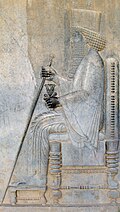Mazaeus
Mazaeus | |
|---|---|
| ) |
Mazaeus or Mazday (
Life
Mazaeus was the penultimate Persian satrap (governor) of Cilicia. His successor in Cilicia was Arsames, who was ultimately expelled by Alexander the Great.
At the
cavalry.As a reward for his recognition of Alexander as the legitimate successor of Darius, Mazaeus was rewarded by being able to retain the satrapy of Babylon, as a Hellenistic satrap.[2] Alexander left a Macedonian, Apollodorus of Amphipolis, as the military commander of the garrison of Babylon, and another as tax-collector.[2] Mazaeus continued minting coins under his name, and later without his name.
The daughter of the Persian king Darius III,
Waldemar Heckel suggested that the Alexander Sarcophagus might have been dedicated to him.[3]
Mazaeus was replaced as satrap of Babylon by Stamenes.[4]
Coinage
Mazaeus had an abundant coinage, which he minted in
. Coinage as Satrap of Cilicia-
Coin ofAramaic: 𐡌 "M" below throne
-
Mazday (Mazaios) as ruler of Sidon. Circa 353-333 BC.
-
Coin ofTarsos, Cilicia.
-
Coin ofArtaxerxes IV as Pharaohs.
Coinage as Satrap of Babylon
-
Coinage of Mazaios as Hellenistic Satrap of Babylon, circa 331-328 BC.
-
Late coinage of Mazaeus as satrap of Babylon.
References
- ISBN 978-0-19-530574-6.
- ^ ISBN 9781134845019.
- ^ Heckel, Waldemar (2006). "Mazaeus, Callisthenes and the Alexander Sarcophagus". Historia. 55 (4): 385–396.
- ISBN 9789004217553.







